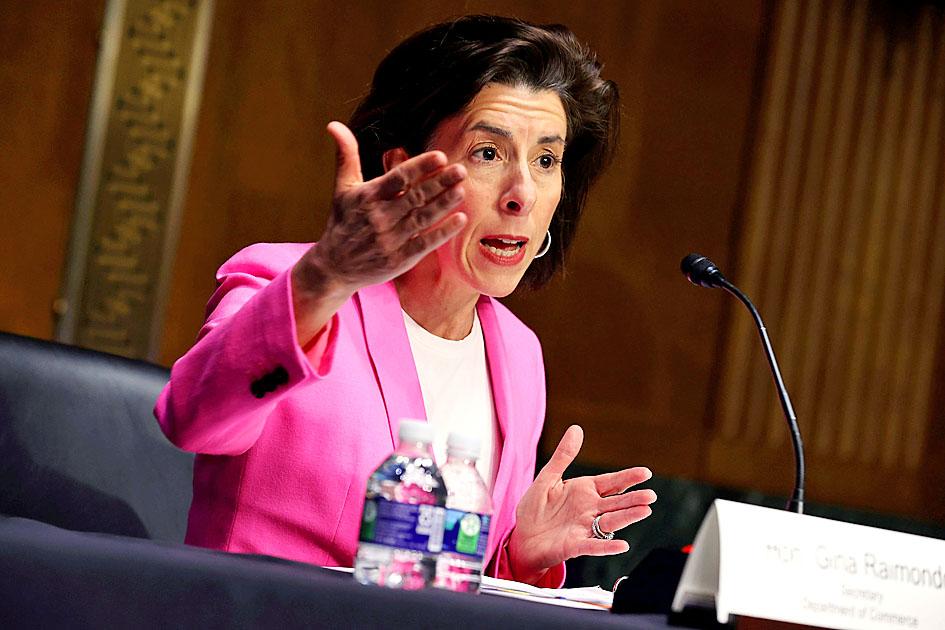US Secretary of Commerce Gina Raimondo on Monday said that a proposed US$52 billion boost in US government funding for semiconductor production and research could result in seven to 10 new US factories.
Raimondo said at an event outside a Micron Technology Inc chip factory that she anticipated the government funding would generate “US$150 billion-plus” in investment in chip production and research — including contributions from state and federal governments and private-sector firms.
“We just need the federal money ... to unlock private capital,” Raimondo said, adding that “it could be seven, could be eight, could be nine, could be 10 new factories in America by the time we’re done.”

Photo: Reuters
She said she expected that states would compete for federal funding for chip facilities and the US Department of Commerce would have a transparent process for awarding funding.
A global shortage of semiconductor chips, caused by factors including a rise in demand for electronic devices during the COVID-19 pandemic, has affected automakers and other industries. Automakers including General Motors Co, Ford Motor Co and Toyota Motor Corp have cut production this year due to the shortage.
US Senator Mark Warner, a Democrat, said at Monday’s event that he thought the funds could result in “seven to 10” new fabrication plants.
“This is not going to solve this overnight,” Warner said. “It will take years for the commerce department to make these investments.”
Last week, US Senate Majority Leader Chuck Schumer unveiled revised bipartisan legislation to spend US$52 billion on US semiconductor chip production and research over five years.
Supporters of funding have said that the US had a 37 percent share of semiconductors and microelectronics production in 1990; today just 12 percent of semiconductors are manufactured in the US.
The bill includes US$39 billion in production and research and development incentives, and US$10.5 billion to implement programs, including the National Semiconductor Technology Center, National Advanced Packaging Manufacturing Program.
US Senator John Cornyn, a Texas Republican who also took part in the joint event, has filed an amendment to remove prevailing wage provisions from the bill.
He said that he wanted a vote on his amendment, as the wage issue was jeopardizing Republican support.
“I don’t expect this is going to stop our achieving what we want to achieve,” Cornyn said, referring to the wage issue. “It’s important, but I think getting the chips for America act passed is essential.”
He said that China has left the United States no option but to make such investments.
“This is a vulnerability we must fix,” he added.

Vincent Wei led fellow Singaporean farmers around an empty Malaysian plot, laying out plans for a greenhouse and rows of leafy vegetables. What he pitched was not just space for crops, but a lifeline for growers struggling to make ends meet in a city-state with high prices and little vacant land. The future agriculture hub is part of a joint special economic zone launched last year by the two neighbors, expected to cost US$123 million and produce 10,000 tonnes of fresh produce annually. It is attracting Singaporean farmers with promises of cheaper land, labor and energy just over the border.

US actor Matthew McConaughey has filed recordings of his image and voice with US patent authorities to protect them from unauthorized usage by artificial intelligence (AI) platforms, a representative said earlier this week. Several video clips and audio recordings were registered by the commercial arm of the Just Keep Livin’ Foundation, a non-profit created by the Oscar-winning actor and his wife, Camila, according to the US Patent and Trademark Office database. Many artists are increasingly concerned about the uncontrolled use of their image via generative AI since the rollout of ChatGPT and other AI-powered tools. Several US states have adopted

A proposed billionaires’ tax in California has ignited a political uproar in Silicon Valley, with tech titans threatening to leave the state while California Governor Gavin Newsom of the Democratic Party maneuvers to defeat a levy that he fears would lead to an exodus of wealth. A technology mecca, California has more billionaires than any other US state — a few hundred, by some estimates. About half its personal income tax revenue, a financial backbone in the nearly US$350 billion budget, comes from the top 1 percent of earners. A large healthcare union is attempting to place a proposal before

KEEPING UP: The acquisition of a cleanroom in Taiwan would enable Micron to increase production in a market where demand continues to outpace supply, a Micron official said Micron Technology Inc has signed a letter of intent to buy a fabrication site in Taiwan from Powerchip Semiconductor Manufacturing Corp (力積電) for US$1.8 billion to expand its production of memory chips. Micron would take control of the P5 site in Miaoli County’s Tongluo Township (銅鑼) and plans to ramp up DRAM production in phases after the transaction closes in the second quarter, the company said in a statement on Saturday. The acquisition includes an existing 12 inch fab cleanroom of 27,871m2 and would further position Micron to address growing global demand for memory solutions, the company said. Micron expects the transaction to